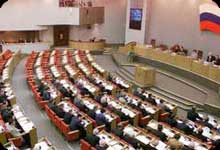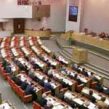
MORE THAN 80,000 INGUSH DENY THEY VOTED IN STATE DUMA ELECTIONS
Publication: Eurasia Daily Monitor Volume: 5 Issue: 5
By:

Following Russia’s State Duma elections last December 2, the United States and some European government said the elections had been neither free nor fair, and Golos, Russia’s only independent vote monitoring group, reported that they had been accompanied by “mass violations” across the country (Independent [London], December 4, 2007). Still, the charges of cheating evoked little public reaction or protest inside Russia. Now, however, at least one Russian region – Ingushetia – is retroactively registering its protest.
On December 4, two days after the voting in the State Duma elections, Ingushetia’s election commission declared that 98.35% of the republic’s eligible voters had gone to the polls and that of these, 98.72% had voted for the United Russia party. Independent observers in the republic, however, said that turnout there was minimal: indeed, the independent Ingushetiya.ru website on December 2 reported that according to local observers, no more than 8% of the republic’s registered voters went to the polls (Chechnya Weekly, December 6, 2007). The website’s proprietor, Magomed Yevloev, subsequently revised that figure downward, telling Kommersant-Vlast that no more than 6% of Ingushetia’s voters went to the polls, and that most of them had voted for the liberal Yabloko party, not United Russia (Chechnya Weekly, December 13, 2007).
Yevloev followed up his claims with action. Under the slogan “Ya ne golosoval!” (I didn’t vote!), he organized a campaign to collect statements from tens of thousands of residents of Ingushetia, attesting to the fact that they did not vote in the State Duma election. To date, Yevloev and his fellow campaigners have collected such statements from 87,340 residents of Ingushetia over the age of 18, which is 54.5 percent of the republic’s eligible voters. The Internet newspaper Izbrannoe quoted participants in the campaign as saying that while they were collecting the statements from Ingushetia residents, the residents said that the reason that they had not voted in the State Duma election was their unhappiness over the policies of Murat Zyazikov, Ingushetia’s Kremlin-backed president, and over corruption and the collapse of the republic’s economy (Izbrannoe, January 10).
Yevloev said the statements from the non-voters – complete with their passport information, including their names and addresses – were put into 290 folders and driven to Moscow. The next step, he said, will be to include them in an appeal to the federal Prosecutor General’s Office, asking it to investigate whether the State Duma elections were lawfully conducted in Ingushetia.
The Zyazikov administration is clearly not happy with the “I didn’t vote!” campaign: Yevloev told the newspaper Gazeta that district and rural administration officials in Ingushetia had sent police after campaigners who had gone to take statements in various parts of the republic, with police in the village of Ordzhonikidzevskaya even trying to seize statements that had been collected. The effort failed, thanks to “stiff resistance” from the campaigners and local residents alike (Gazeta, January 11). Noting that he and his campaigners have faced “serious impediments” in some areas, including being unceremoniously removed by police, Yevloev told Izbrannoe that the campaign must now decide whether to continue to collect statements from Ingushetia residents. “We will have to decide whether the statements we have already connected are enough to include in an appeal to the Prosecutor General’s Office or will we have to poll the entire population of the republic,” he told the newspaper (Izbrannoe.ru, January 10). According to campaign organizers, statements have not yet been taken from the inhabitants of 24 villages, including the large village of Ekazhevo, or from the residents of several districts of Nazran, Ingushetia’s largest city (Gazeta, January 11).
Given the realities of Russia’s “sovereign democracy,” it remains an open question whether a campaign like “I didn’t vote!” can have any real effect or is simply a quixotic and ultimately futile attempt at a civic activism. “The problem is that public opinion and the press is indifferent to this,” the political scientist Dmitry Oreshkin told Izbrannoe. “But, on the other hand, we have stability. That is the principal value. Under the current system of values, few are ready to raise a serious clamor. Even a journalist who undertakes to write about this feels almost like an enemy of the state: the whole nation is getting off its knees and you write that there were no elections in Ingushetia. That means you are an enemy of the people … In the current climate, even I now feel uncomfortable – [like] a ‘slanderer of the Motherland’.”
Both Oreshkin and Yevloev predicted that the Ingush authorities would now try to pressure some of the 87,340 residents of Ingushetia who have given statements to “I didn’t vote!” to deny that they did so, thereby creating a pretext for accusing the campaign of falsifying statements and discrediting it. In any case, Yevloev said that if no criminal investigation is launched into the falsification of the State Duma elections in Ingushetia, he and his fellow campaigners would take the case to the European Court of Human Rights in Strasbourg.




